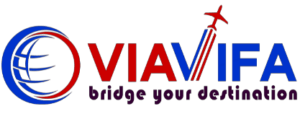Work Visa Sponsorship vs. Self-Sponsorship

In the world of immigration, navigating visas can be challenging and critical, especially when deciding between a company-sponsored work visa and a self-sponsored visa for anyone looking to work or settle abroad to shape their career journey.
Both pathways open doors to international employment opportunities, yet they come with distinct advantages, challenges, and drawbacks, making it essential to align the choice differently with individual goals and circumstances. Understanding the differences, benefits, and processes involved in each option is crucial for making an informed decision.
Understanding Work Visa Sponsorship
Work visa sponsorship typically involves an employer supporting your application for a work visa and often takes on responsibilities like filing paperwork, covering visa fees, and proving your skills align with the job market requirements. This option is common for skilled roles where employers have specific job requirements and actively seek international candidates to fill them. This pathway is widely chosen by professionals who secure job offers abroad.
Advantages:
- Financial Support: Employers often bear the costs of visa processing, relocation, legal fees, and sometimes accommodation.
- Job Security and Stability: Sponsorship generally indicates a firm job offer, often with long-term employment intentions, i.e., tied to a specific job, offering stability upon arrival.
- Simplified Immigration Process: Employers handle most administrative tasks, i.e., the paperwork, making it easier for employees to focus on settling in.
- Pathway to Permanent Residency: Many countries allow sponsored employees to transition to permanent residency after a certain period.
Disadvantages:
- Dependency on Employer: Visas are often tied to the employer, limiting flexibility to change jobs without reapplying, i.e., you may face limited job mobility as the visa is tied to a specific employer.
- Limited Choice: Sponsored employees have less control over their work environment or conditions, i.e., this is often restricted to specific industries or skill shortages.
- Restricted Career Growth: Changing roles or companies may require re-application or sponsorship transfer, which can be time-consuming.
- Termination Risks: Losing your job might jeopardize your visa application status.
Step-by-Step Key Process
If you decide on work visa sponsorship, follow these steps to increase your chances of securing the right job and visa:
Step 01 – Research and Identify Target Employers Offering Sponsorship:
- Identify countries where your skills are in demand and where companies are open to sponsoring international workers.
- Look for job listings specifying visa sponsorship or contact multinational companies with established sponsorship programs.
- Research all the companies actively hiring international candidates in your industry.
- Use platforms like LinkedIn, Glassdoor, or company career pages to find openings.
Step 02 – Apply for Sponsored Roles
- Tailor your resume and cover letter to highlight skills aligned with the job description, including work experience, language skills, and qualifications relevant to sponsored positions.
- Network with company representatives to increase your chances.
Step 03 – Obtain a Job Offer
- Prepare for Interviews and Negotiate Sponsorship
- Secure a written job offer that confirms your employer’s intention to sponsor your visa.
- Be transparent about visa needs and negotiate terms if sponsorship is offered.
Step 04 – Employer Initiates Sponsorship
- The employer files required documents with the immigration authorities.
- These documents typically include labor certification and evidence of your qualifications.
- Work with your employer to complete the visa application, ensuring all requirements are met.
Step 05 – Visa Approval and Relocation
- Once approved, the visa allows you to enter the country and begin work.
- Your employer often assists with onboarding and relocation.
VIAVIFA’s services include:
- Job Search Assistance: Identify companies offering visa sponsorship in your field.
- Application Support: Craft compelling resumes, cover letters, and job applications.
- Relocation Assistance: Offer tips and resources for a seamless transition.
- Visa Process Guidance: Help employers and employees navigate visa filings, ensuring compliance with immigration laws.
Understanding Self-Sponsorship
Self-sponsorship allows individuals to apply for a work visa independently without relying on an employer, often via entrepreneur, freelancer, or investor visas, by proving their skills, entrepreneurial ventures, academic, or professional merits.
This path offers greater flexibility and is ideal for professionals who prefer to work autonomously or run their own business abroad.
Advantages
- Flexibility: Freedom to choose employers, projects, or clients without being bound to a specific company.
- Independence: You are not tied to a specific employer, offering greater career flexibility.
- Entrepreneurial Opportunities: Business-oriented visas allow you to establish, manage, and grow your business or venture abroad.
- No Termination Risk: Your visa status remains intact, even if you change roles or projects.
- Broad Eligibility: Options are available for talented individuals, academics, investors, and skilled professionals.
- Career Control: Opportunity to pursue multiple roles or business ventures simultaneously.
- Potential for Residency: Some self-sponsored visas offer pathways to permanent residency faster than employer-sponsored options.
Disadvantages
- Financial Responsibility: Applicants must cover visa fees, proof of funds, associated travel and relocation expenses, and meet proof of funds requirements.
- Increased Administrative Work: Applicants manage the visa process independently, including gathering documentation, meeting compliance requirements, and handling renewals.
- Higher Rejection Risk: Without the stability of employer sponsorship, there’s a higher risk if income from freelancing or entrepreneurship is inconsistent. Approval is not guaranteed and heavily depends on meeting strict criteria, which increases the risk of rejection.
- Complex Application Process: Preparing business plans or showcasing talent and proof of achievements may require significant and detailed documentation.
- Longer Processing Times: Self-sponsored visas often involve more rigorous scrutiny, leading to delays that can take months due to detailed evaluations.
Step-by-Step Key Process
For those leaning toward self-sponsorship, these steps can help streamline the application process:
Step 01 – Choose the Right Self-Sponsorship Visa
- Research available visa categories, such as entrepreneur visas, investor visas, or talent-based visas, in your target country, as each has unique requirements and benefits.
- Common examples include the U.S. EB-2 National Interest Waiver (NIW) and the UK Innovator Visa.
Step 02 – Gather Supporting Documents
- Prepare a business plan (if required) for entrepreneur visas; a solid business plan can be essential to demonstrating your commitment and capability.
- Prepare a comprehensive application, including financial proof, business plans, or academic credentials.
- Ensure your documentation meets the specific visa category requirements.
- Some self-sponsored visas require proof of sufficient funds or client contracts to ensure financial stability.
Step 03 – File the Visa Application
- Submit your application through the official immigration portal of the destination country.
- Pay applicable fees and provide biometric data as required.
Step 04 – Submit Application and Monitor Progress
- Complete the application independently or with legal assistance, then track it regularly to respond promptly to requests for further documentation.
Step 05 – Await Decision
- Processing times vary by country and visa type.
- Respond promptly to any additional requests for information.
Step 06 – Establish Your Presence in the Destination Country
- For business visas, launch your venture.
- For talent visas, work in the industry specified in your application.
VIAVIFA’s services include:
- Visa Eligibility Assessment: Identify companies offering visa sponsorship in your field.
- Business Plan Development: Assist with creating robust business proposals for entrepreneur or investor visas.
- Documentation Preparation: Compile and verify required documents, such as proof of funds and credentials.
- End-to-End Support: Guide you through application submission, interviews, and post-approval steps.
Comparing Pros and Cons: A Summary

Which Option Should You Choose?
Choose Work Visa Sponsorship if:
- You have a strong job offer in a foreign country.
- You prefer the stability of an employer-backed application.
- You want financial and administrative support for your relocation.
- You value stability over flexibility.
- You seek a stable, structured work environment.
Choose Self-Sponsorship if:
- You have entrepreneurial or professional independence.
- You can financially support yourself and meet visa criteria, i.e., you can afford the costs and meet visa requirements.
- You want flexibility in career or business choices.
How Can VIAVIFA Help?
At VIAVIFA, we assist clients in navigating and simplifying the complexities of both visa sponsorship pathways. Our tailored services include:
- Personalized consultation to evaluate your eligibility and identify visa pathways suited to your goals.
- Practical advice on relocation resources to help you settle in your new country.
- Expert assistance with compiling accurate document preparation and complete visa application submission.
- End-to-end support throughout the visa application process, from initial evaluation to post-approval stages.
- Providing guidance on transitioning to permanent residency.
Both work visa sponsorship and self-sponsorship have unique benefits and challenges. When choosing, consider your career goals, financial situation, and willingness to handle the administrative demands of self-sponsorship. Those seeking stability may prefer employer sponsorship, while those valuing independence may benefit from the flexibility of self-sponsorship. Evaluate your options carefully, seek professional guidance, and take the next step confidently.
